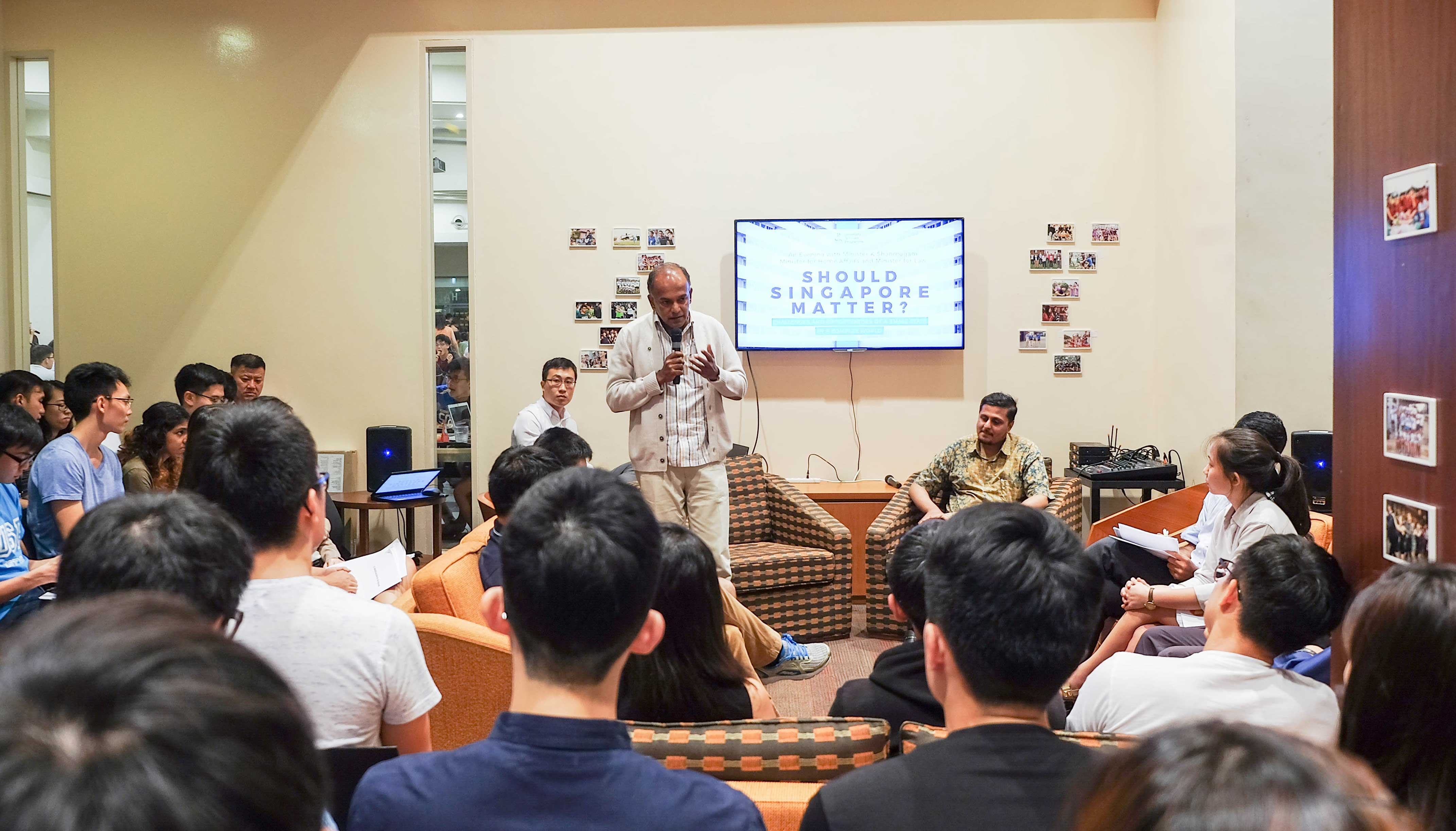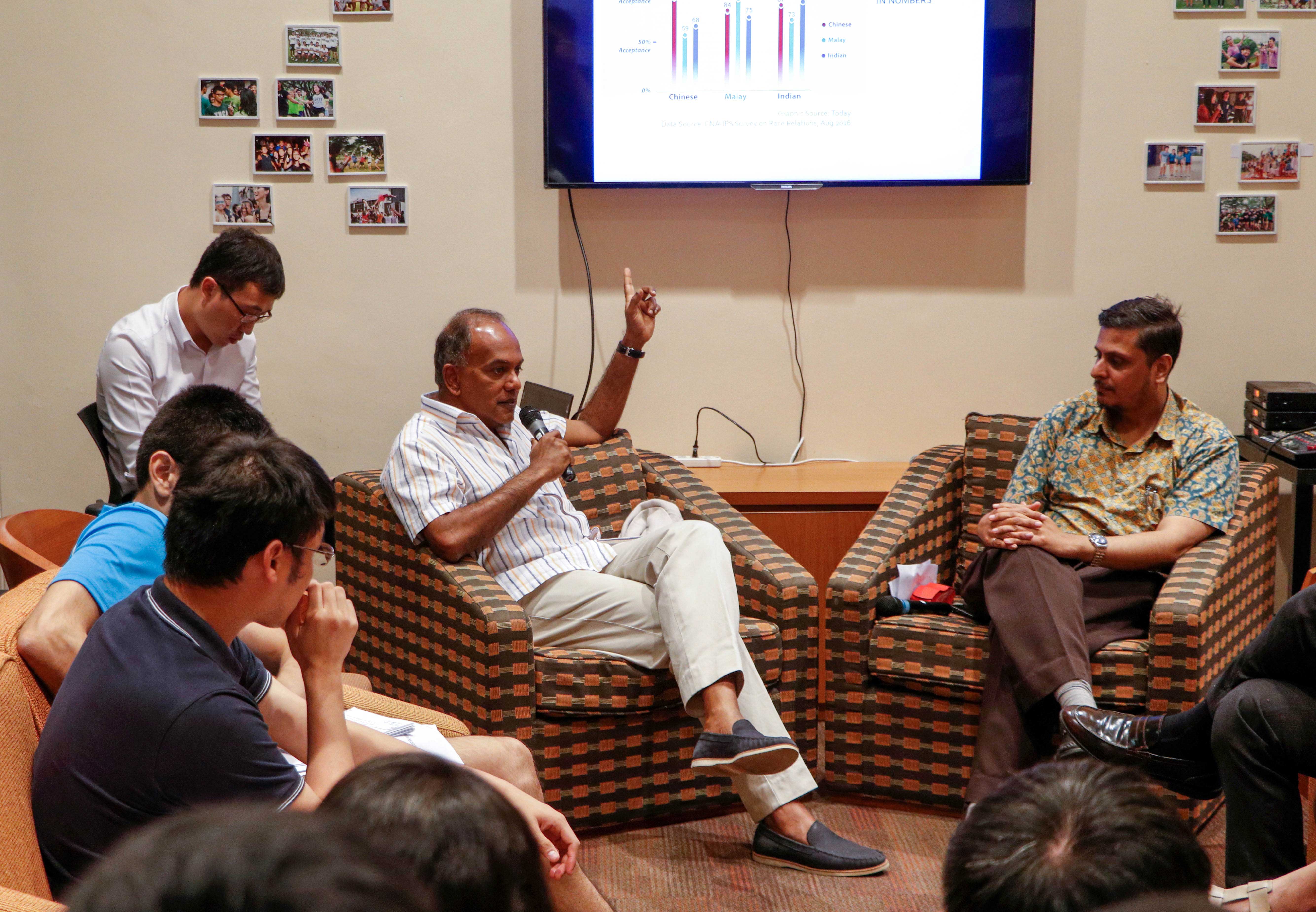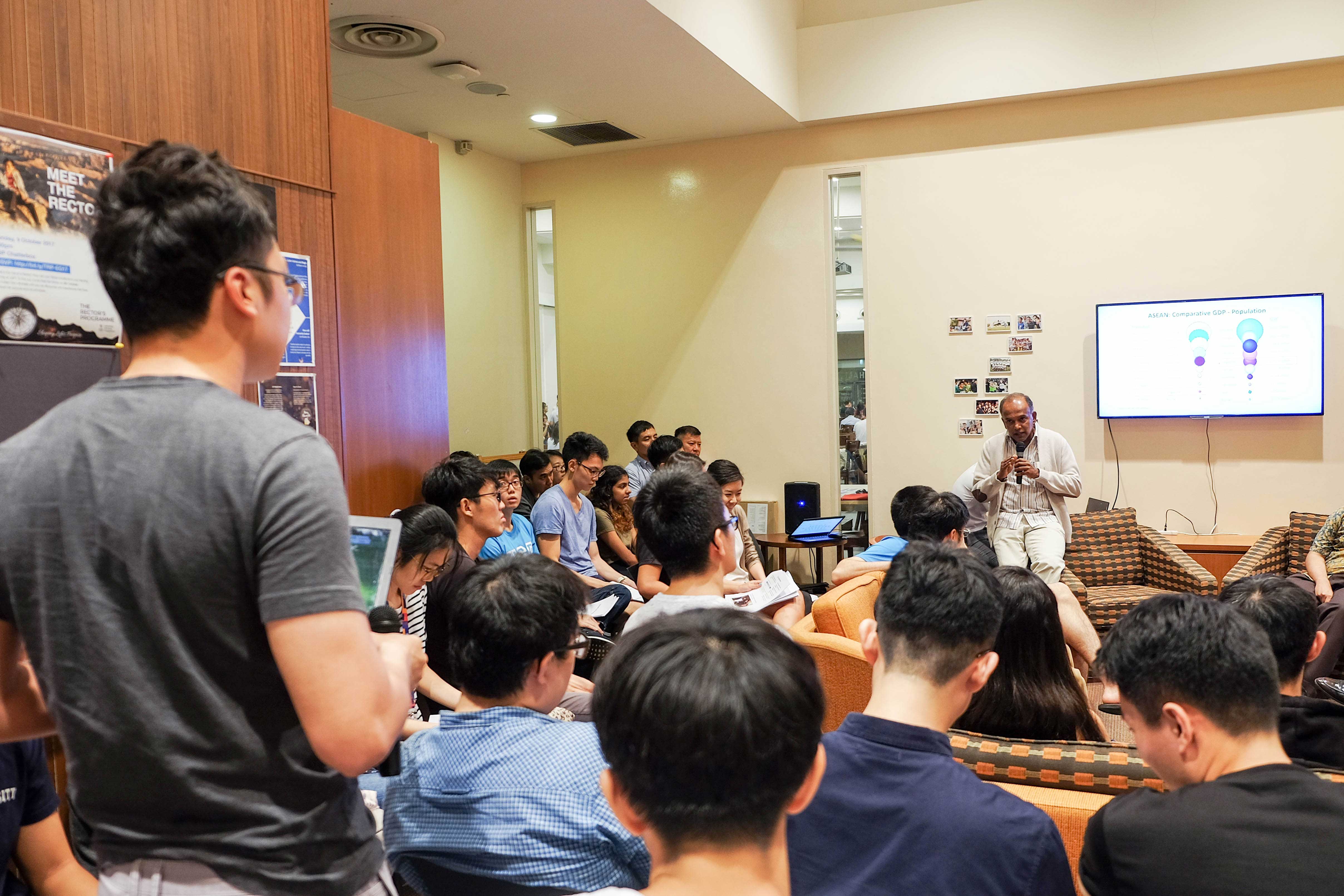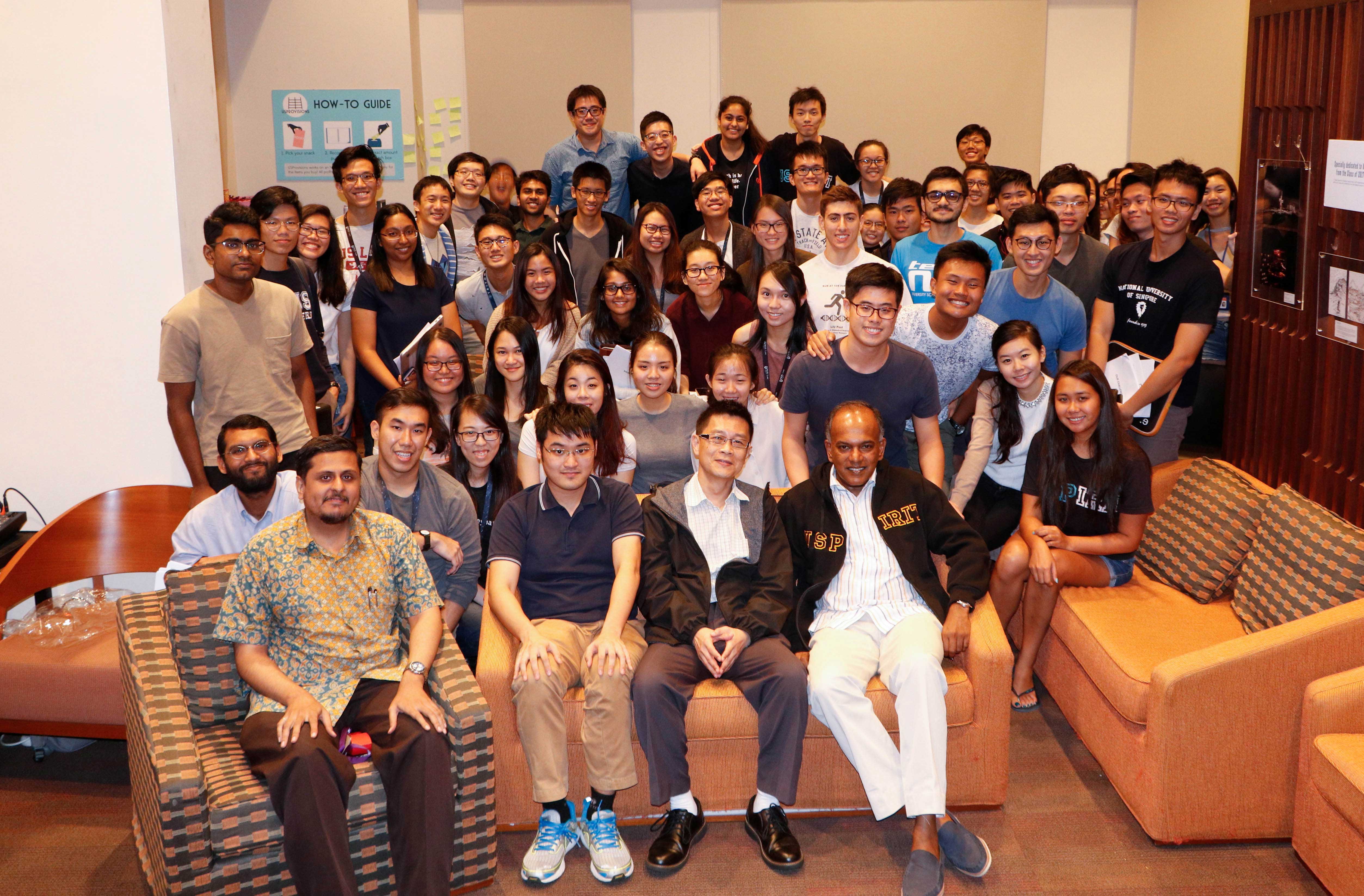"Should Singapore Matter?" Minister K. Shanmugam Speaks
by Stella Soon Jia Yi (FASS + USP, Class of 2021)
Stella is a guest writer for USP Highlights.
Published: 13 November 2017
The crowd gathering in USP’s Chatterbox at Cinnamon College on the evening of 2 November was proof that something exciting was about to happen. And exciting it was – Minister for Home Affairs and Minister for Law, Mr K. Shanmugam, swung by USP for a talk with USP students on the topic “Should Singapore Matter?: Challenges and Opportunities of a Small State in a Complex World”.
For close to 3 hours, Minister Shanmugam elaborated on the challenges and opportunities faced by Singapore in this increasingly volatile global landscape, and took questions from the floor regarding his viewpoints on extremism, Singapore’s economy, foreign policy, and a variety of other topics.

Minister Shanmugam delivering his opening remarks.

Minister Shanmugam posed interesting questions for our USP community to ponder and discuss.
Challenges faced by a small state in a complex world
He began with a presentation of the internal and external challenges faced by Singapore in today’s complex world.
A key challenge Minister Shanmugam touched on was Singapore’s demographic challenges. Our declining birth rate means the Singapore population is aging rapidly. As the demand for healthcare and social service support increases, expenditure in these areas will rise. This will pose a new set of socio-economic challenges to the society, which led to Minister Shanmugam’s question: “What does that do to your income tax and healthcare system?”
Undeniably, there will be extra strain put on Singapore’s healthcare and related industries. While increasing taxes is one way to ease this strain, there is a limit to how high taxation can be – and that makes it difficult for a concerted push to increase taxes.

Minister Shanmugam expounding on a point during the discussion.
The other internal challenges Minister highlighted included the increasing income gap and Singapore’s political leadership. Given that the income gap between citizens will keep increasing, and there is a knock-on effect from income to wealth, Singapore’s rich-poor divide is likely to keep rising. Minister then raised this question: "If we increase income taxes to reduce this divide, will the rich go overseas or will they stay in Singapore?"
Minister Shanmugam also opined that Singapore’s leadership determines our success. To him, good leadership will help solve Singapore’s various problems. If we abandon decisive governance for populist leadership, we will go down the same road as other countries and suffer severe consequences – especially given our small, land-scarce country.
Apart from these internal challenges, he also brought up the external challenges faced by Singapore. Violent extremism was the centrepiece. He cited the number of terrorist attacks and organisations in the Southeast Asian region that have pledged allegiance to the Islamic State in Iraq and Syria (ISIS) as an example. This places Singapore in the middle of a highly volatile region, with our citizens being cocooned from the reality of the region.
Questions from the floor

USP students took the chance to engage actively with Minister Shanmugam during the Q&A.
From his structured flow of thoughts and probing questions, Minister Shanmugam had clearly thought through these issues deeply. He then opened the floor to questions, and judging by the number of hands that went up, we knew a lively discussion was bound to follow.
One memorable question was on Singapore’s ban of the controversial preacher, Mufti Menk, from entering the country. He was banned on the grounds of his segregationist and divisive teachings – for example, Menk argued that Muslims should not wish people of other religions on their religious festivals. One student asked about the reason for the ban, and Minister Shanmugam answered by first outlining the influence that religious leaders held. Religious leaders have authority and significant influence because of their belief in God. Hence, they are taken seriously by their followers, who believe their words are God’s will.
If Menk had been allowed to preach and his words believed, Minister Shanmugam reckoned there would be real-world consequences for Singapore. For example, there might be no more greetings between neighbours of different races, which would deepen the gulf between the different races and religions in Singapore. Considering how multiculturalism and harmony is important for Singapore’s well-being, Minister Shanmugam believed this would go against the fundamentals of our society. The student who raised this issue also offered his viewpoint, and the candid discussion between the two was certainly one highlight of the evening.
Wrapping up the question and answer segment was a question that drew laughs when it was posed. Someone asked who would be the next Prime Minister of Singapore, to which Minister Shanmugam replied “no one knows, and no one has decided yet”. He did, however, share his view on how the next Prime Minister would probably be chosen. This person would be elected mainly by the next generation of ministers, with the senior ministers having some say as well. Besides that, the new peer-chosen Prime Minister would likely be somebody in the 50s, so that this person has a 10 to 15-year runway in his or her premiership.
Closing
It was truly a privilege to have Minister Shanmugam drop by USP. Despite feeling under the weather, he interacted with students for several hours. At the end of the evening, students applauded in gratitude and USP Director Prof Kang Hway Chuan presented the Minister with a USPIRIT hoodie in appreciation on behalf of the USP community.
Giving a closing summary for the evening, USP faculty Dr Mustafa Izzuddin referred everyone back to the initial question “Should Singapore Matter?”. He urged everyone present to discuss the points raised that evening, in smaller groups. Ultimately, we should individually and collectively try to contribute positively to society, so that we can truly make Singapore matter.

The USP community was thrilled to have Minister Shanmugam at our Chatterbox that Thursday evening.
Photos taken by USP student Dikaios Pang (Law + USP, Class of 2021)

